California Consumer Privacy Act (CCPA) and General Data Protection Regulation (GDPR) are the most challenging data protection laws. Below, we discuss GDPR vs. CCPA in detail.
Both robust data regulations allow the collection of data but with the user’s consent, and they also impose punishments in case of non-compliance.
Several consent management services aid in procuring consent, such as Seers’ Consent Management Platform (CMP), which manages the consent of 1.2 billion users worldwide. So, it is clear that privacy laws are essential to maintain privacy. Also, there is a need to promote awareness regarding privacy concerns.
Also, Seers CMP has been highly efficient in taking users’ consent via highly customisable GDPR and CCPA-compliant cookie consent banners and pop-ups, which you can redesign with your logo and colour schemes in 28 multiple languages. Sign in and Start for free.
GDPR and CCPA are laws that ensure users’ data protection and privacy. However, these laws have some similarities but some differences. Keep on reading because Seers is explaining it all.
Mainly, For an in-depth comparison, there is a table present below :
Application:
| GDPR | CCPA |
| Any organisation, including NGOs otherwise and public entities which target EU consumers. | Businesses that process the personal data of at least 50,000 Californian consumers. |
or for the UK targeting UK consumer. | At least 50% of their revenue is from sharing Californian consumer data. |
| Having aggregated annual income of 25M or more. |

GDPR VS CCPA Users Consent:
| GDPR | CCPA |
| GDPR requires consent before the collection and processing of personal data. | CCPA does not require prior consent for the collection and processing of data. |
| The unnecessary cookies should be placed on default before user consent. | However, a company must obtain the user’s consent to sell the consumer’s data to a third party. |
| Consent can be obtained via GDPR-compliant cookie consent banners or pop-ups. | |
| Furthermore, Article 6 elaborates that the company must also specify the purpose of obtaining and processing information. |
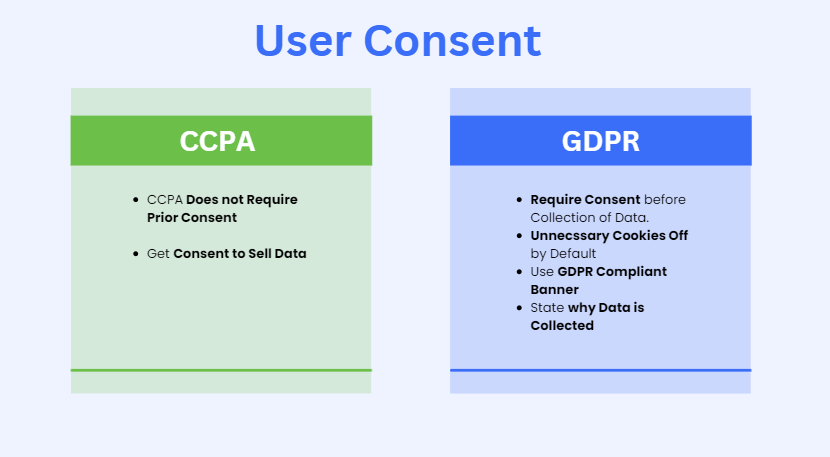
With Seers GDPR and CCPA cookie consent banners, you can obtain user consent within seconds while highlighting your cookie consent policy. This also helps monetise your business by maintaining a rich inventory of user-consented data. So sign in and start for free.
GDPR VS CCPA Valid and informed consent
| GDPR | CCPA |
| Opt-in and Opt-out: | Opt-out: |
| GDPR emphasises deliberate consent. However, it doesn’t notably ban opt-out consent. | The California Consumer Privacy Act (CCPA) allows consumers to opt out and stop businesses from selling their information. |
| The Information Commissioner Office (ICO) states that opt-out options “are essentially the same as pre-ticked, banned boxes”. Freely given:GDPR’s recital 32 further explains that consent should be given freely. “Consent should be given by a clear affirmative act establishing a freely given, specific, informed and unambiguous indication of the data subject’s agreement to the processing of personal data.” | A company can add “Do not sell my information” in the cookie consent banner or pop-ups so that a user may decide whether his information can be sold or not to a third party. |
| In short, a user can opt-in and opt out. |
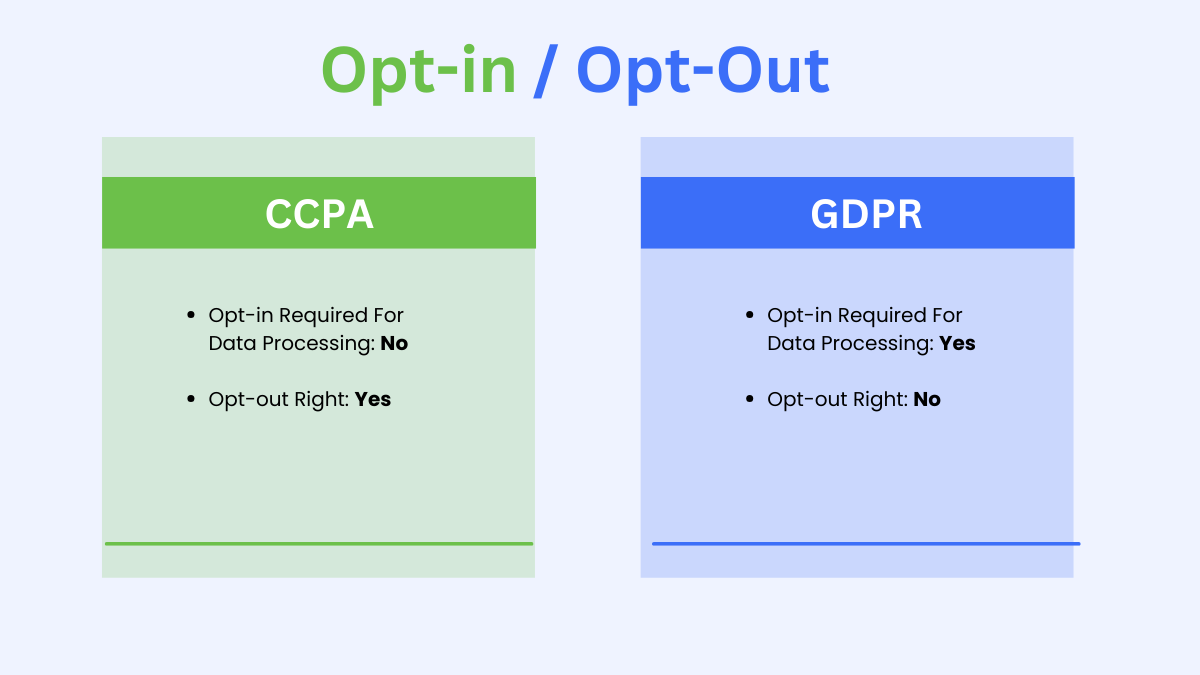
Also, accelerate your business with Seers- the industry’s leading Consent Management Platform that complies with GDPR, CCPA, LGPD, e Privacy and PECR. Sign in and start for free free
GDPR VS CCPA Child Consent:
If you want to know more about Child consent. Click here.
| GDPR | CCPA |
| Under Article 8 of GDPR, the age of consent required for a child to process their data is 16. | In CCPA, businesses must obtain parental consent (“right to opt-in”) for kids. |
| Member states are allowed to determine the age of consent, which is capped at 13 years. | Between the ages of 13 and 16, the consumer must authorise their personal information affirmatively. |
| In the UK, the age of consent is 13, which is the lowest age the GDPR will allow. | However, if a child is under 13, a parent or guardian is required to give consent. |
| Under GDPR, businesses must obtain consent from a child’s legal guardian if the child is under 16. | If the child is under 13 years old, a parent or guardian must also affirmatively authorise the sale of information. |
| That’s why GDPR cookie consent banners are needed, which are child-friendly. | CCPA cookie consent banners that are child-friendly |
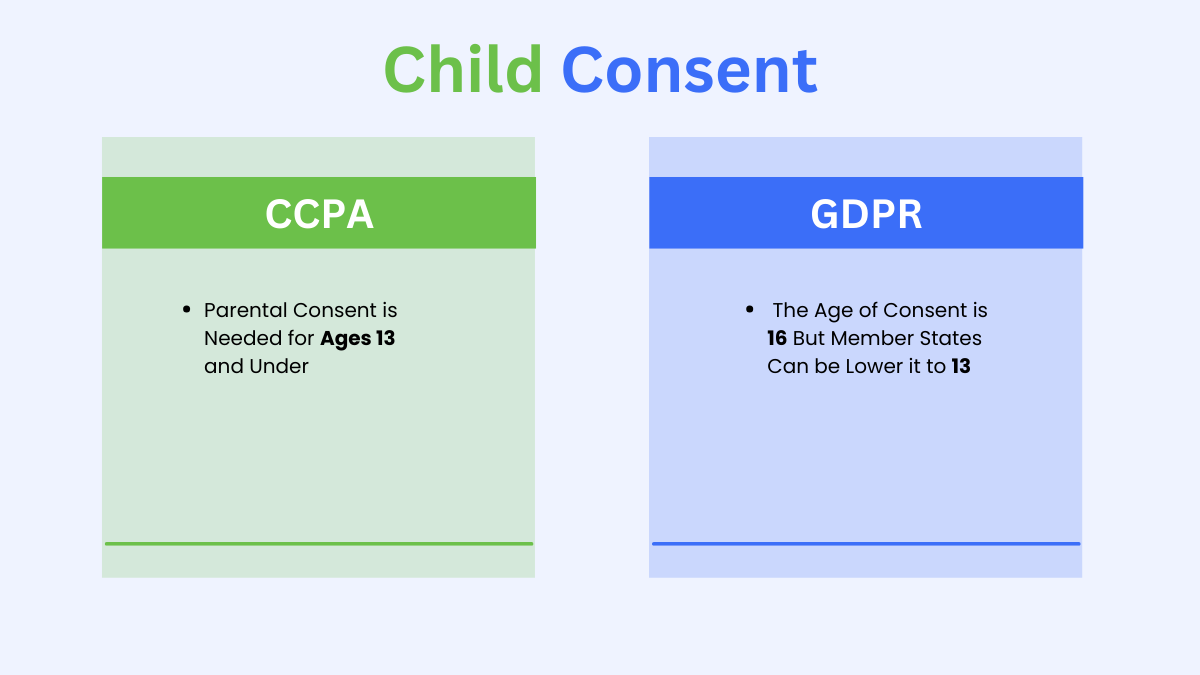
So, accelerate your profits with Seers’ highly customisable CCPA and GDPR-compliant child-friendly cookie consent banners. Also, you can design your banner with your logo colour in multiple languages up to 28.
However, banner changes must be according to privacy laws. In addition to privacy laws, personal data always demands protection. Therefore, these laws are integrated and introduced. Objectives of these laws are:
- Firstly, to protect the data of clients.
- Secondly, to make businesses follow the rules.
- Thirdly, defining the terms of personal data and its protection
- Lastly, it gives people the right to provide consent. Start for free.
GDPR VS CCPA Data Protection :
| GDPR | CCPA |
| Any data which can lead to the identification of a person is mandated to be protected | The data that can identify a particular consumer or household except for public government records |
| The IP address is personal data (a unique address that aids in identifying a device on the internet or a local network). | IP addresses under CCPA are personal data (a unique address that aids in identifying a device on the internet or a local network) |
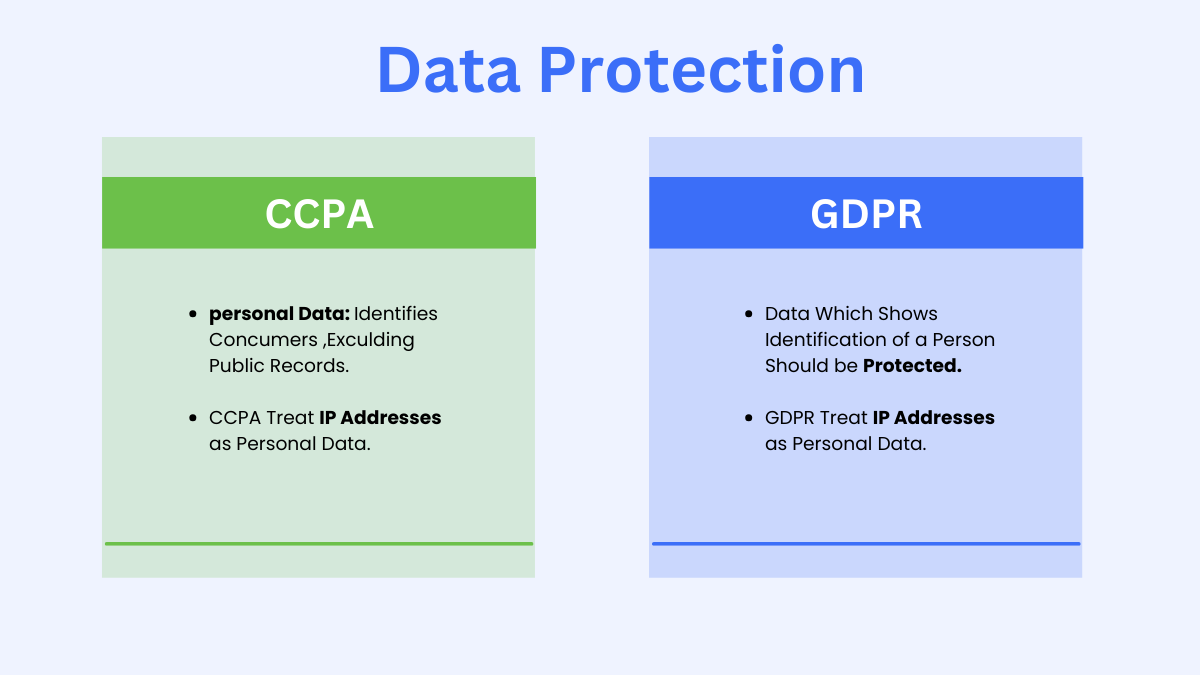
GDPR VS CCPA Businesses (B2C and B2B):
| GDPR | CCPA |
| It applies to data subjects defined as any “identifiable natural person” residing in the EU or the UK. | It applies to consumers only. |
| There is no differentiation between protection applied to B2B and B2C interactions. |
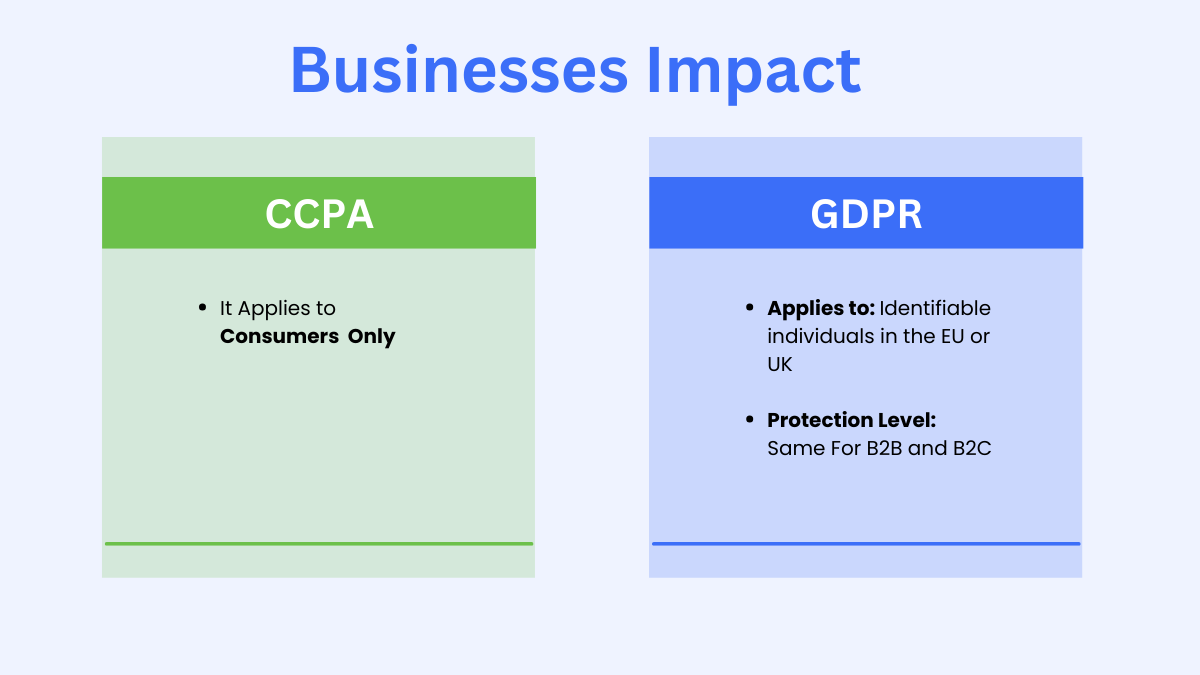
So, configure your business needs and obtain compliance with Seers Consent Management Platform while accelerating your profits. Complying with these privacy laws is undoubtedly essential now, especially for website owners and large organisations.
Additionally, ignoring privacy laws can cause legal consequences. So it is important to know the consequences:
- Firstly, authorities impose fines
- Secondly, Authorities take penalties and legal actions.
- Thirdly, client trust is lost
- Lastly, corporate image is also affected
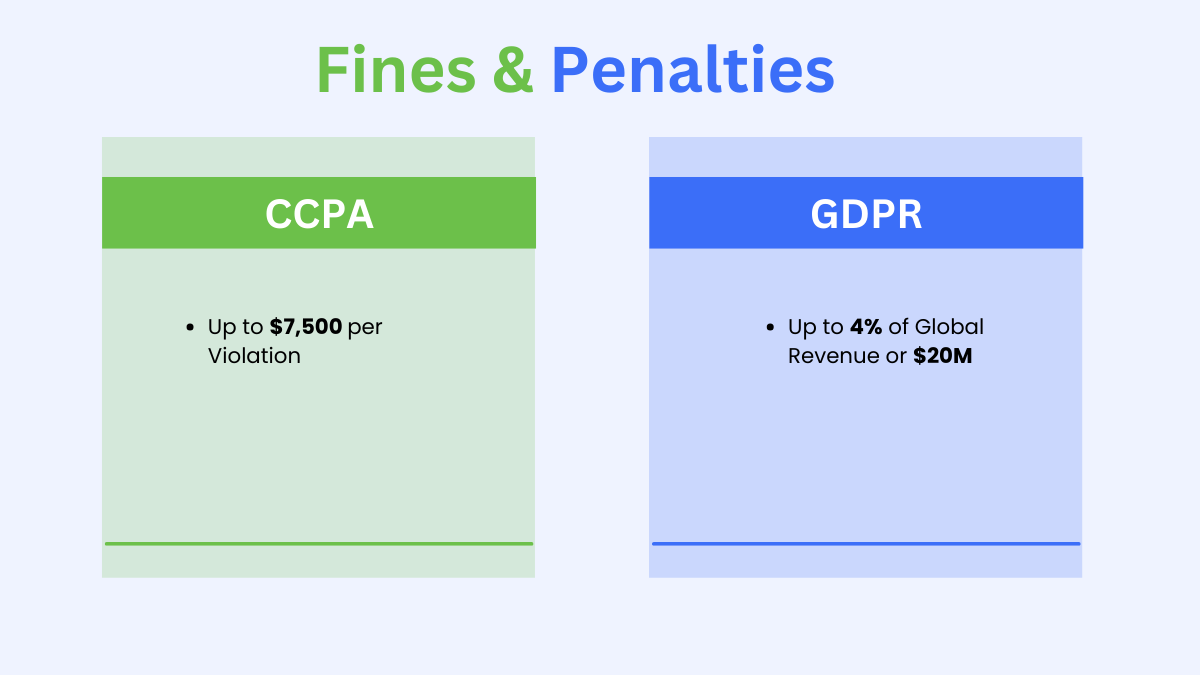
Following these laws will:
- Firstly, make companies compliant with privacy laws
- Secondly, it emphasises on data protection
- Thirdly, it promotes data records and safe usage
- Lastly, it promotes privacy and adherence to laws. Sign in and start for free.
CCPAV/S GDPR Cookie Consent language/text:
| GDPR | CCPA |
| Specify all types of cookies and other tracking technologies. | CCPA is different from GDPR in that it does not require prior consent. |
| Revoke consent on each specific group of cookies. | However, it emphasises that businesses must inform their users about the categories of personal information they collect through cookies. Like:Purpose of collection of information. |
| consent should be obtained before data processing | Also, mention the third-party businesses that might sell information to. |
| give users a choice of cookie acceptance or non-acceptance | Same in CCPA, the cookie consent CCPA banner language should be easy. |
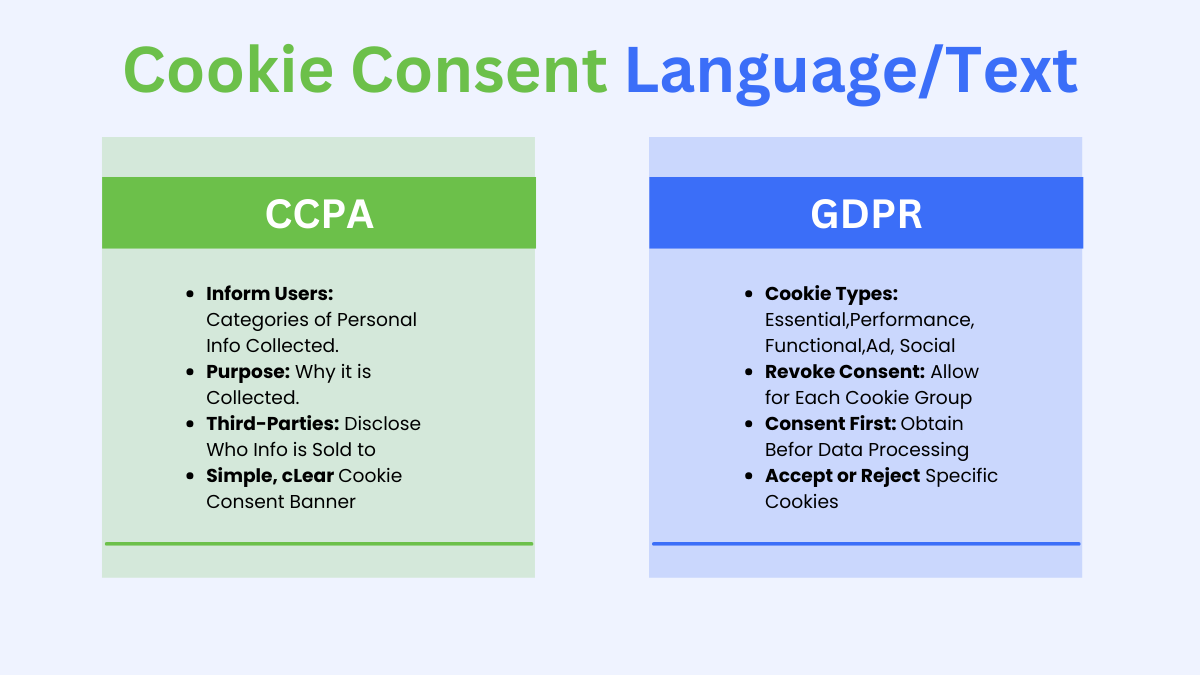
However, both laws grant users unique rights that make their presence so effective. Even so, both laws have their own text, but the aim is similar: data privacy. Additionally, what makes these laws so important is the legal requirement for companies to comply with them.
Despite the importance of privacy laws, companies still need to meet and understand the criteria. Consequently, people are now aware of privacy laws and regulations and know how to take legal action if someone breaches their privacy.
Website owners should know the importance of these laws, especially for those who use websites frequently. Additionally, fines and penalties hold the horses accountable for breaches.
CCPA V/S GDPR User’s Right:
| User’s Right | GDPR | CCPA |
| Right of Disclosure or Access | Yes | Yes |
| Right to Deletion / Erasure (The Right to be Forgotten) | Yes | Yes |
| Right of rectification | Yes | No |
| Right to Restrict Processing | Yes | Yes ( Right to Opt-out) |
| Right of Data Portability | Yes | Yes |
| Right to Object to Automated Decision-Making | Yes | None |
| Responding to Rights Requests | Yes | Yes |
Bottom Line:
Undoubtedly, CCPA and GDPR cookie consent banners and pop-ups are necessary for obtaining users’ consent. Thus, the omnipresence of these laws is an undeniable fact. Also, when people are concerned about privacy, they look for security.
With a proper system, user-consented data can be collected. On the other hand, tracking technologies work to collect data. So, such cookies or tracking technologies should also be used without any breach or illegal means.
So, this way, creating a rich inventory of users’ consented data can attract advertisers and marketers to your website. However, you must select a consent management platform to meet your business needs.
Seer is a platform that will provide you with all the essentials of these laws. Unquestionably, these laws are now a legal requirement. Complying with these laws is essential.
Therefore, Seers strive to provide the best services possible. Lastly, consent management is imperative for companies. So, one must choose a suitable consent management platform. Undoubtedly, Seers has earned the trust of millions of customers.
In short, Seers CMP is a perfect choice for you because it is compliant with GDPR, CCPA, LGPD,e Privacy, and PECR, integrated with Google consent mode, and accepted by the IAB.
Sign in and start for free because this is the right way to obtain consent. Obviously, the right way is always the best way. So, it is concluded that both laws are important.
Frequently Asked Questions (FAQs)
What is GDPR?
GDPR stands for General Data Protection Regulation. It’s a European law that protects people’s personal data and privacy. It requires businesses to handle data responsibly and gives individuals more control over their information.
What is CCPA?
CCPA stands for California Consumer Privacy Act. It’s a California law that protects residents’ personal data. It lets people know what information businesses collect about them and gives them rights to control that data.
CCPA vs. GDPR: Which is better?
Both CCPA and GDPR aim to protect personal data, but GDPR is more comprehensive and applies to all European Union countries. CCPA focuses on California residents and offers specific rights about data collection and sale. Which is better depends on your location and needs.
Who needs to comply with CCPA and GDPR?
Businesses that handle personal data of EU citizens must follow GDPR. Companies that collect data from California residents need to comply with CCPA. Both laws apply to businesses regardless of where they are based if they handle the respective data.
